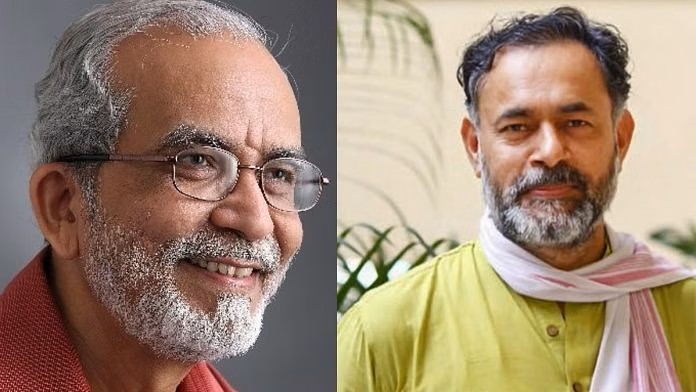18 Jun. 24: Prominent political scientists Suhas Palshikar and Yogendra Yadav have formally requested the National Council for Educational Research and Training (NCERT) to remove their names as chief advisors from the Political Science textbooks for classes 9 to 12. This action stems from significant and controversial changes made to the textbooks, which the academics describe as “mutilated” and “academically dysfunctional”.
The modifications, part of a so-called “rationalization” process by NCERT, have involved the removal of numerous sections, including references to the 2002 Gujarat riots, topics related to Mahatma Gandhi, and the Rashtriya Swayamsevak Sangh (RSS). Palshikar and Yadav argue that these deletions were made without any pedagogic rationale and without their consultation, significantly reducing the educational value of the textbooks.
In their letter to NCERT Director D.S. Saklani, the scholars expressed their embarrassment at being associated with the revised textbooks. They criticized the arbitrary nature of the cuts, which they believe serve political interests rather than educational ones. The scholars emphasized that the frequent deletions undermine the purpose of the textbooks, which is to foster critical thinking and an understanding of political science among students.
The scholars’ concerns are heightened by the fact that last year, along with 33 other academics, they had already requested their names be removed due to similar issues. Despite this, NCERT proceeded to publish and distribute new editions of the textbooks without making the requested changes.
Yadav described the situation as “strange,” noting that while some people fight to have their names included in publications, they are demanding the opposite. “How can they force us to have our names published?” he questioned.
Despite these objections, NCERT has maintained that the changes were based on expert recommendations and aimed at reducing the content load for students. The organization has also stated that the textbooks are scheduled for revision in 2024 under the new National Curriculum Framework.
Recent NCERT textbook revisions have sparked widespread controversy. For instance, the Class 12 political science textbook now describes the Babri Masjid as a “three-domed structure,” reducing the original four-page section on Ayodhya to two pages. Other significant details have also been removed. The Class 11 political science textbook now links vote bank politics to “minority appeasement,” suggesting that political parties prioritize minority group interests over principles of equality.
Since 2014, NCERT textbooks have undergone four rounds of revisions. In 2017, NCERT cited the need to reflect recent events, followed by a 2018 revision aimed at reducing curriculum burden. Subsequent changes in response to COVID-19 aimed to help students recover from learning disruptions.
In May last year, NCERT announced the removal of references to a separate Sikh nation and ‘Khalistan’ from the Class 12 political science textbook. Similarly, references to the Indian Farmers’ Union and the farmer movement of the 1980s were removed from the “Rise of Popular Movements” chapter.
Furthermore, the Class 11 political science textbook “Indian Constitution at Work” saw the removal of references to India’s first Education Minister Maulana Abul Kalam Azad and the terms of Jammu and Kashmir’s accession to India under Article 370.
Other revisions include the removal of sections on the Mughal era and the 2002 Gujarat riots from Class 12 history textbooks, along with deletions related to Mahatma Gandhi. In 2022, chapters on the environment were removed from the curriculum, sparking protests from educators. Content on caste discrimination was removed during the COVID-19 pandemic, and earlier, sections on nationalism and caste struggles in Travancore were omitted from Class 10 and 9 history textbooks, respectively.
These ongoing changes and the resistance from contributing scholars highlight the contentious nature of NCERT’s textbook revisions.




